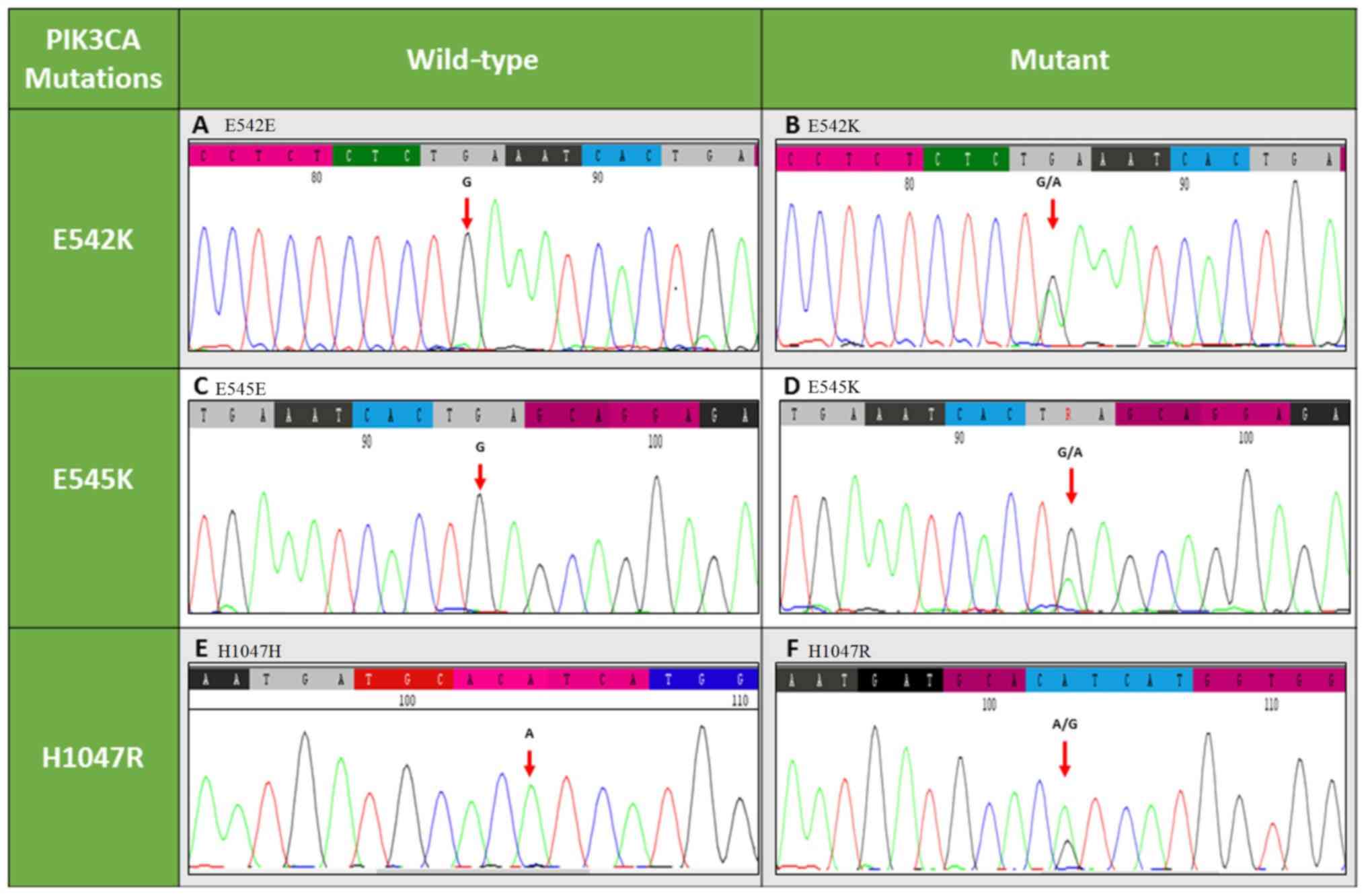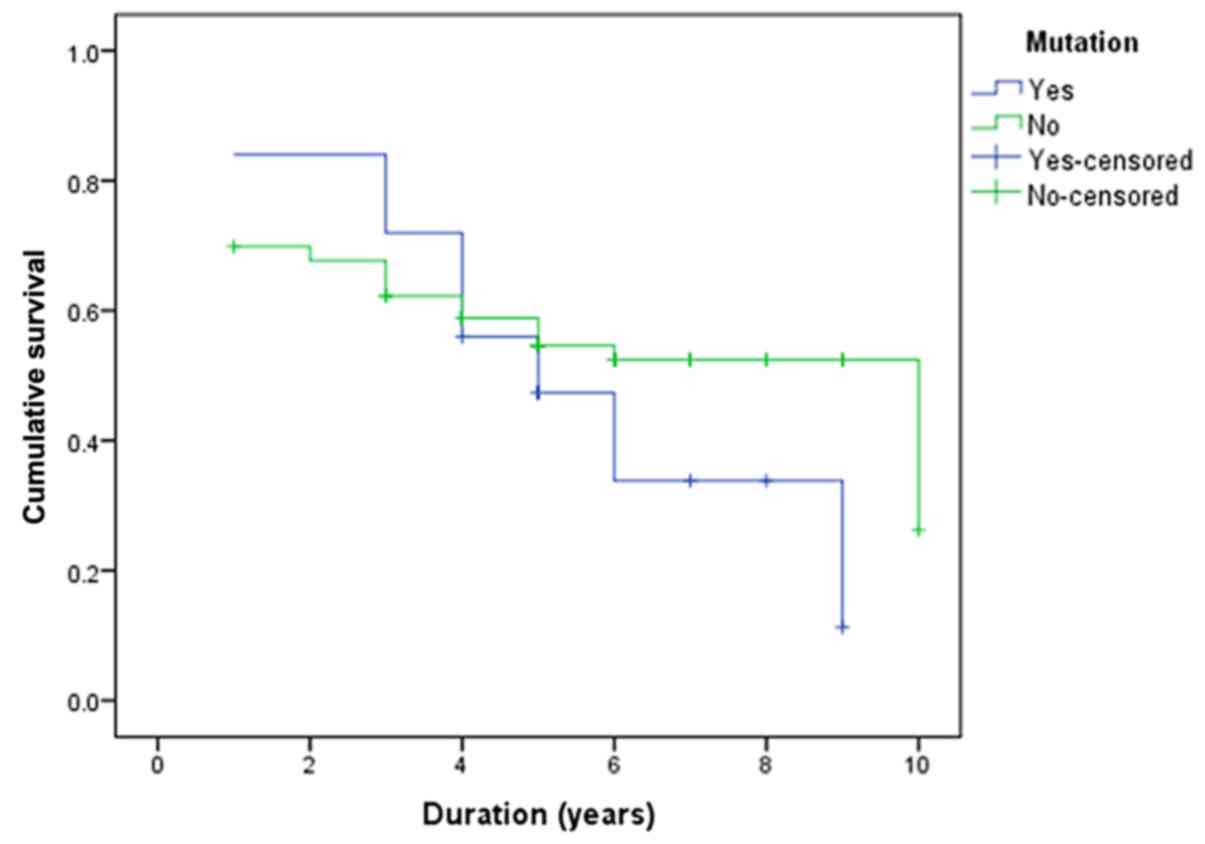|
1
|
Ghoncheh M, Pournamdar Z and Salehiniya H:
Incidence and mortality and epidemiology of breast cancer in the
world. Asian Pac J Cancer Prev. 17:43–46. 2016. View Article : Google Scholar : PubMed/NCBI
|
|
2
|
Cizkova M, Dujaric ME, Lehmann-Che J,
Scott V, Tembo O, Asselain B, Pierga JY, Marty M, de Cremoux P,
Spyratos F and Bieche I: Outcome impact of PIK3CA mutations in
HER2-positive breast cancer patients treated with trastuzumab. Br J
Cancer. 108:1807–1809. 2013. View Article : Google Scholar : PubMed/NCBI
|
|
3
|
Samuels Y, Wang Z, Bardelli A, Silliman N,
Ptak J, Szabo S, Yan H, Gazdar A, Powell SM, Riggins GJ, et al:
High frequency of mutations of the PIK3CA gene in human cancers.
Science. 304:5542004. View Article : Google Scholar : PubMed/NCBI
|
|
4
|
Pang B, Cheng S, Sun SP, An C, Liu ZY,
Feng X and Liu GJ: Prognostic role of PIK3CA mutations and their
association with hormone receptor expression in breast cancer: A
meta-analysis. Sci Rep. 4:62552014. View Article : Google Scholar : PubMed/NCBI
|
|
5
|
Stemke-Hale K, Gonzalez-Angulo AM, Lluch
A, Neve RM, Kuo WL, Davies M, Carey M, Hu Z, Guan Y, Sahin A, et
al: An integrative genomic and proteomic analysis of PIK3CA, PTEN,
and AKT mutations in breast cancer. Cancer Res. 68:6084–6091. 2008.
View Article : Google Scholar : PubMed/NCBI
|
|
6
|
Li SY, Rong M, Grieu F and Iacopetta B:
PIK3CA mutations in breast cancer are associated with poor outcome.
Breast Cancer Res Treat. 96:91–95. 2006. View Article : Google Scholar : PubMed/NCBI
|
|
7
|
Campbell RA, Bhat-Nakshatri P, Patel NM,
Constantinidou D, Ali S and Nakshatri H: Phosphatidylinositol
3-kinase/AKT-mediated activation of estrogen receptor alpha: A new
model for anti-estrogen resistance. J Biol Chem. 276:9817–9824.
2001. View Article : Google Scholar : PubMed/NCBI
|
|
8
|
Ellis MJ, Lin L, Crowder R, Tao Y, Hoog J,
Snider J, Davies S, DeSchryver K, Evans DB, Steinseifer J, et al:
Phosphatidyl-inositol-3-kinase alpha catalytic subunit mutation and
response to neoadjuvant endocrine therapy for estrogen receptor
positive breast cancer. Breast Cancer Res Treat. 119:379–390. 2010.
View Article : Google Scholar : PubMed/NCBI
|
|
9
|
Lai YL, Mau BL, Cheng WH, Chen HM, Chiu HH
and Tzen CY: PIK3CA exon 20 mutation is independently associated
with a poor prognosis in breast cancer patients. Ann Surg Oncol.
15:1064–1069. 2008. View Article : Google Scholar : PubMed/NCBI
|
|
10
|
Lerma E, Catasus L, Gallardo A, Peiro G,
Alonso C, Aranda I, Barnadas A and Prat J: Exon 20 PIK3CA mutations
decreases survival in aggressive (HER-2 positive) breast
carcinomas. Virchows Arch. 453:133–139. 2008. View Article : Google Scholar : PubMed/NCBI
|
|
11
|
Maruyama N, Miyoshi Y, Taguchi T, Tamaki
Y, Monden M and Noguchi S: Clinicopathologic analysis of breast
cancers with PIK3CA mutations in Japanese women. Clin Cancer Res.
13:408–414. 2007. View Article : Google Scholar : PubMed/NCBI
|
|
12
|
Pérez-Tenorio G, Alkhori L, Olsson B,
Waltersson MA, Nordenskjöld B, Rutqvist LE, Skoog L and Stål O:
PIK3CA mutations and PTEN loss correlate with similar prognostic
factors and are not mutually exclusive in breast cancer. Clin
Cancer Res. 13:3577–3584. 2007. View Article : Google Scholar : PubMed/NCBI
|
|
13
|
Barbareschi M, Buttitta F, Felicioni L,
Cotrupi S, Barassi F, Del Grammastro M, Ferro A, Dalla Palma P,
Galligioni E and Marchetti A: Different prognostic roles of
mutations in the helical and kinase domains of the PIK3CA gene in
breast carcinomas. Clin Cancer Res. 13:6064–6069. 2007. View Article : Google Scholar : PubMed/NCBI
|
|
14
|
Ligresti G, Militello L, Steelman LS,
Cavallaro A, Basile F, Nicoletti F, Stivala F, McCubrey JA and
Libra M: PIK3CA mutations in human solid tumors: Role in
sensitivity to various therapeutic approaches. Cell Cycle.
8:1352–1358. 2009. View Article : Google Scholar : PubMed/NCBI
|
|
15
|
Jensen JD, Knoop A, Laenkholm AV,
Grauslund M, Jensen MB, Santoni-Rugiu E, Andersson M and Ewertz M:
PIK3CA mutations, PTEN, and pHER2 expression and impact on outcome
in HER2-positive early-stage breast cancer patients treated with
adjuvant chemotherapy and trastuzumab. Ann Oncol. 23:2034–2042.
2012. View Article : Google Scholar : PubMed/NCBI
|
|
16
|
Hashimoto K, Tsuda H, Koizumi F, Shimizu
C, Yonemori K, Ando M, Kodaira M, Yunokawa M, Fujiwara Y and Tamura
K: Activated PI3K/AKT and MAPK pathways are potential good
prognostic markers in node-positive, triple-negative breast cancer.
Ann Oncol. 25:1973–1979. 2014. View Article : Google Scholar : PubMed/NCBI
|
|
17
|
Mukohara T: PI3K mutations in breast
cancer: Prognostic and therapeutic implications. Breast Cancer
(Dove Med Press). 7:111–123. 2015.PubMed/NCBI
|
|
18
|
Saal LH, Holm K, Maurer M, Memeo L, Su T,
Wang X, Yu JS, Malmström PO, Mansukhani M, Enoksson J, et al:
PIK3CA mutations correlate with hormone receptors, node metastasis,
and ERBB2, and are mutually exclusive with PTEN loss in human
breast carcinoma. Cancer Res. 65:2554–2559. 2005. View Article : Google Scholar : PubMed/NCBI
|
|
19
|
Mankoo PK, Sukumar S and Karchin R: PIK3CA
somatic mutations in breast cancer: Mechanistic insights from
Langevin dynamics simulations. Proteins. 75:499–508. 2009.
View Article : Google Scholar : PubMed/NCBI
|
|
20
|
Zhao JJ, Liu Z, Wang L, Shin E, Loda MF
and Roberts TM: The oncogenic properties of mutant p110alpha and
p110beta phosphatidylinositol 3-kinases in human mammary epithelial
cells. Proc Natl Acad Sci USA. 102:18443–18448. 2005. View Article : Google Scholar : PubMed/NCBI
|
|
21
|
Papaxoinis G, Kotoula V, Alexopoulou Z,
Kalogeras KT, Zagouri F, Timotheadou E, Gogas H, Pentheroudakis G,
Christodoulou C, Koutras A, et al: Significance of PIK3CA mutations
in patients with early breast cancer treated with adjuvant
chemotherapy: A Hellenic Cooperative Oncology Group (HeCOG) study.
PLoS One. 10:e01402932015. View Article : Google Scholar : PubMed/NCBI
|
|
22
|
Cancer Incidence report Saudi Arabia 2014,
. http://www.chs.gov.sa/En/HealthRecords/CancerRegistry/Pages/CancerRegistryRecords.aspx2014
|
|
23
|
Zhang BN, Cao XC, Chen JY, Chen J, Fu L,
Hu XC, Jiang ZF, Li HY, Liao N, Liu DG, et al: Guidelines on the
diagnosis and treatment of breast cancer (2011 edition). Gland
Surg. 1:39–61. 2012.PubMed/NCBI
|
|
24
|
Al-Amri AM, Vatte C, Cyrus C, Chathoth S,
Hashim TM, Mohamed YS, Al Ali R, Alsaid A and Al Ali A: Novel
mutations of PIK3CA gene in head and neck squamous cell carcinoma.
Cancer Biomark. 16:377–383. 2016. View Article : Google Scholar : PubMed/NCBI
|
|
25
|
Regad T: Targeting RTK signaling pathways
in cancer. Cancers (Basel). 7:1758–1784. 2015. View Article : Google Scholar : PubMed/NCBI
|
|
26
|
Vatte C, Al Amri AM, Cyrus C, Chathoth S,
Acharya S, Hashim TM, Al Ali Z, Alshreadah ST, Alsayyah A and
Al-Ali AK: Tyrosine kinase domain mutations of EGFR gene in head
and neck squamous cell carcinoma. Onco Targets Ther. 10:1527–1533.
2017. View Article : Google Scholar : PubMed/NCBI
|
|
27
|
Karakas B, Colak D, Kaya N, Ghebeh H,
Al-Qasem A, Hendrayani F, Toulimat M, Al-Tweigeri T, Park BH and
Aboussekhra A: Prevalence of PIK3CA mutations and the SNP
rs17849079 in Arab breast cancer patients. Cancer Biol Ther.
14:888–896. 2013. View Article : Google Scholar : PubMed/NCBI
|
|
28
|
Beelen K, Opdam M, Severson TM, Koornstra
RH, Vincent AD, Wesseling J, Muris JJ, Berns EM, Vermorken JB, van
Diest PJ and Linn SC: PIK3CA mutations, phosphatase and tensin
homolog, human epidermal growth factor receptor 2, and insulin-like
growth factor 1 receptor and adjuvant tamoxifen resistance in
postmenopausal breast cancer patients. Breast Cancer Res.
16:R132014. View Article : Google Scholar : PubMed/NCBI
|
|
29
|
Abramson VG, Cooper Lloyd M, Ballinger T,
Sanders ME, Du L, Lai D, Su Z, Mayer I, Levy M, LaFrance DR, et al:
Characterization of breast cancers with PI3K mutations in an
academic practice setting using SNaPshot profiling. Breast Cancer
Res Treat. 145:389–399. 2014. View Article : Google Scholar : PubMed/NCBI
|
|
30
|
Diekstra A, Bosgoed E, Rikken A, van Lier
B, Kamsteeg EJ, Tychon M, Derks RC, van Soest RA, Mensenkamp AR,
Scheffer H, et al: Translating sanger-based routine DNA diagnostics
into generic massive parallel ion semiconductor sequencing. Clin
Chem. 61:154–162. 2015. View Article : Google Scholar : PubMed/NCBI
|
















